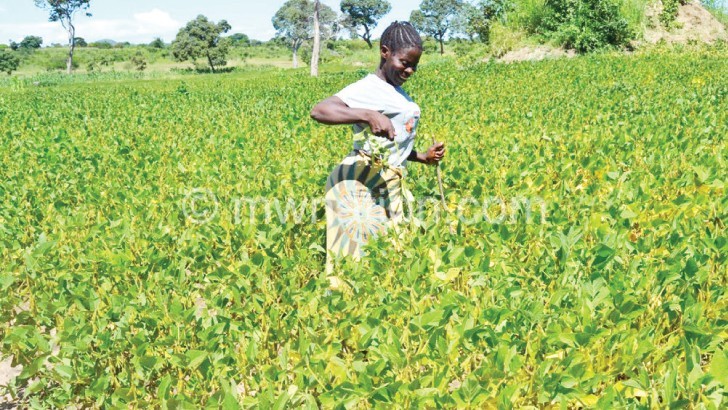Project earns farmers K3.5m
A pilot project for soya beans which targeted over 900 smallholder farmers by giving them inputs and loans has raked in K3.5 million ($4 895) in profits and achieved a loan recovery rate of 93 percent.
The project dubbed Alternative Financing Mechanism is being run by Malawi Oilseed Sector Transformation Programme (Most), Agricultural Commodity Exchange for Africa (ACE), Clinton Development Initiative (CDI) and Agri-inputs Suppliers Limited (Aisl).

ACE senior programmes manager Abbie Morris said in an interview last week that since its inception, the project has enhanced Malawi’s soya sector by providing numerous essential business elements currently inaccessible to most of the country’s smallholder growers.
She said: “The elements in question included basic material inputs such as seed and soya inoculants, but also offered vital services such as greater access to credit and end markets as well as basic agricultural training for enhanced, high-quality soya production.
“To do this, however, all of the organisations signed on for substantial risks, including the potential loss of materials and resources as well as possible apathy from the farming community during a very difficult growing season.”
Most provided technical assistance and financing while ACE presented significant improvements to market access as well as implementing the lion’s share of the project’s management.
Aisl supplied soya inoculants and training for the input, with CDI providing vital certified seed and agronomy training.
Morris said not only have smallholder farmers responded positively, they have also delivered and enjoyed substantial success from the venture.
She said with an agreement to repay the project’s material loans from soya yields, the 954 project participants, 563 of whom are women, managed to repay an impressive 93 percent of their loans.
“Moreover, yields from the four pilot areas of Lilongwe, Kasungu, Ntchisi and Mchinji are expected to deliver about K3.5 million of profit earmarked to go back to farmers,” she said.
Project manager Anne Cécile-Delwaide said she was amazed at the success of the initiative, as there is potential for even bigger gains over the next growing season and plans are already underway for expansion to other districts.
‘This programme has been great, the buyers are happy because they have enjoyed access to large volumes of high quality soya yields at one time, and farmers are thrilled because they have had access to inputs, training, and occasionally greater yields, to say nothing of the best prices possible. This has been a win-win for everybody involved,” she said.
Cécile Delwaide said after a few years of tinkering, it has become self-sustaining and a permanent support mechanism for Malawi’s smallholder farmers.
“A sustainable market-based model for supporting smallholders would indeed be a welcome success,” she said.





